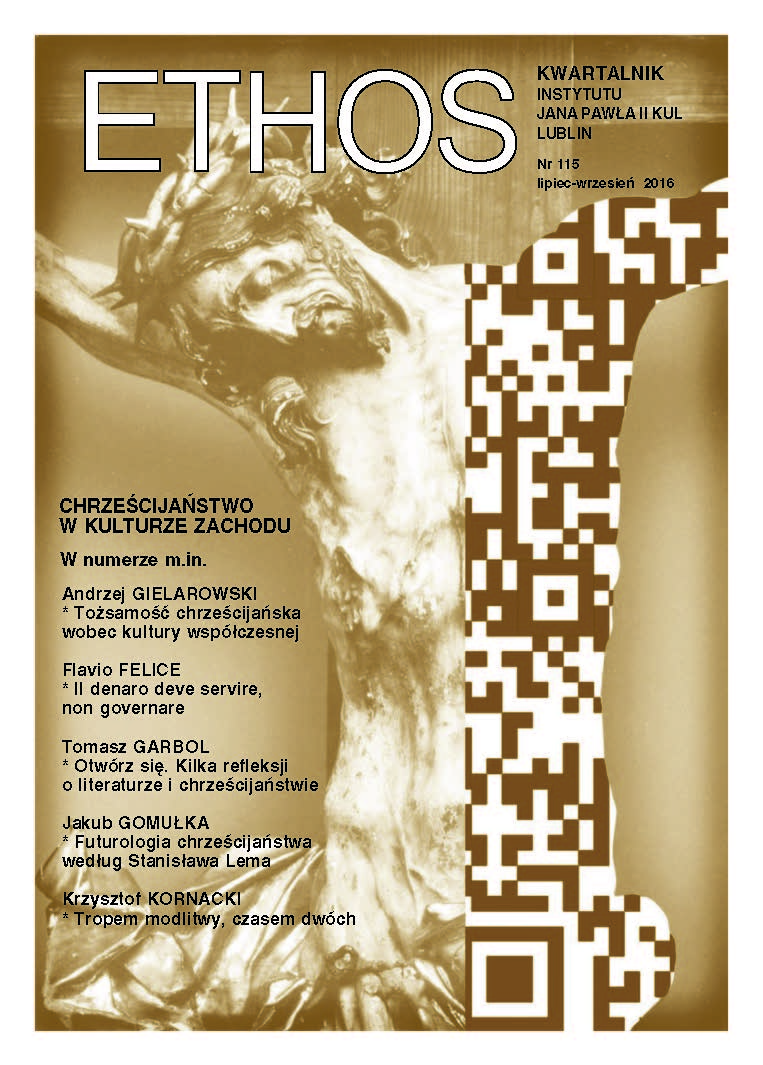Od sądu powinnościowego do „Primum ethicum et primum anthropologicum convertuntur”. O dwóch sensach autonomii etyki według Tadeusza Stycznia SDS
From ‘Duty Judgment’ to Primum Ethicum et Primum Anthropologicum Convertuntur: On the Two Senses of the Autonomy of Ethics Elaborated by Tadeusz Styczeń, SDS
Author(s): Kazimierz KrajewskiSubject(s): Christian Theology and Religion, Philosophy, Ethics / Practical Philosophy, Theology and Religion
Published by: Katolicki Uniwersytet Lubelski Jana Pawła II - Instytut Jana Pawła II, Wydział Filozofii
Keywords: autonomy of ethics; Tadeusz Styczeń; moral duty; moral experience; ethical judgment; duty judgment; judgments on the right means; normative power of truth; self-constitution of the moral subject
Summary/Abstract: The article focuses on Tadeusz Styczeń’s approach to the issue of the autonomy of ethics. Styczeń held that the source of the autonomy of ethics is the subject’s experience of the moral duty to act (or, in other words, the direct cognitive grasp of this duty by the subject). The experience in question makes ethics—in the aspect of its object—methodologically independent of other disciplines, and thus autonomous. The nature of the autonomy of ethics is therefore a corollary of the conception of the moral experience. Apart from the moral experience, there is also another determinant of the autonomy of ethics, namely, the relation between ethics and anthropology. One may point to two conceptions of experience in Styczeń’s ethics: ‘dignitas based’ (characteristic of his early views), built upon the recognition of the directness that characterizes the experience of the duty to affi rm the dignity of the human person, and ‘veritas based’ (worked out in the fi nal period of his research work), referring to the experience of the assertion inherent in the subject’s cognitive act and demonstrating that it is only the assertion in question that enables the subject to grasp the dignity of the person. Accordingly, two different concepts of the autonomy of ethics may be distinguished in Styczeń’s thought. During the period he developed the concept of the ‘dignitas based’ experience Styczeń held that the problem of the autonomy of ethics involves a consideration of the three aspects of the ethical judgment (the duty, the right means of action, the existential dimension). Each of these calls for a different justifi cation. Duty judgments have justifi cation in the experience, while judgments concerning the right means to act are justifi ed based on anthropological knowledge. Therefore, while ethics is autonomous at its starting point, it depends on anthropology in the aspect of the right means to act, and in this sense loses its autonomy. In the existential aspect, the duty judgment demands a metaphysical justifi cation, which, however, does not violate the autonomy of ethics. In the light of the ‘veritas based’ conception of the moral experience, the problem of the autonomy of ethics is formulated no longer within the plane of ethical judgment, but rather within that of the act of experience of truth on the part of the cognitive subject. In this approach the primacy of duty (of the normative power of truth) makes ethics epistemologically and methodologically autonomous. The experience of the normative power of truth, or the starting point of ethics, is simultaneously the starting point of anthropology, since the experience in question comprises a self-discovery of the subject, as well as the subject’s self-constitution as a moral subject. Styczeń sums up this argument in Latin, saying: Primum anthropologicum et primum ethicum convertuntur. In the case of the ‘veritas based’ conception of the moral experience the autonomy of ethics consists in the ‘interchangeability’ of the starting point of ethics and that of anthropology.
Journal: Ethos. Kwartalnik Instytutu Jana Pawła II KUL
- Issue Year: 29/2016
- Issue No: 3
- Page Range: 237-246
- Page Count: 10
- Language: Polish
- Content File-PDF

